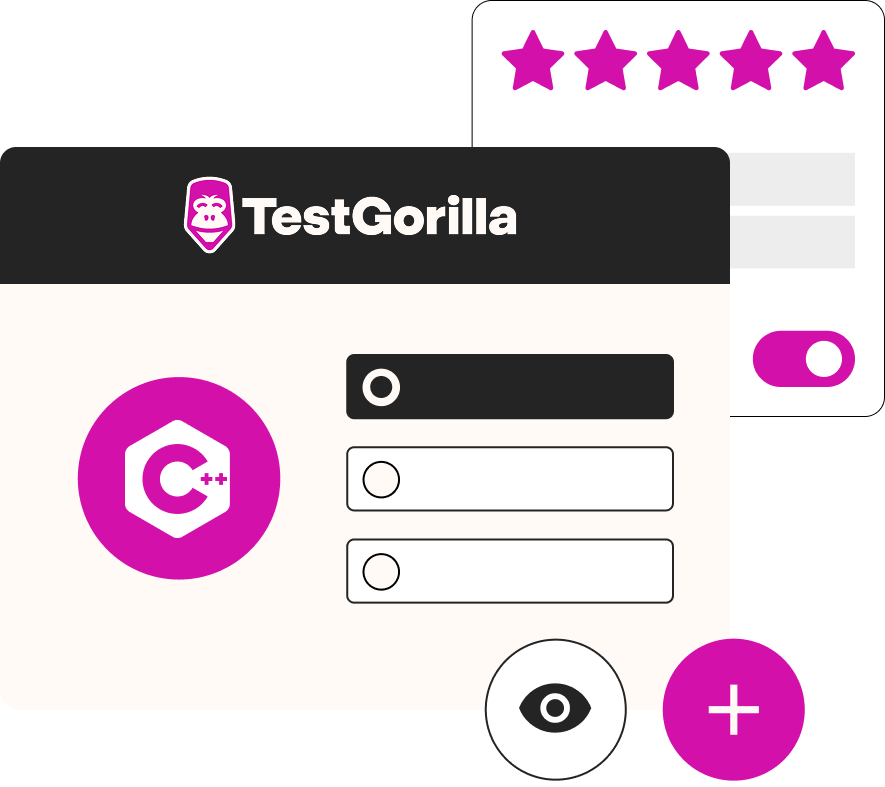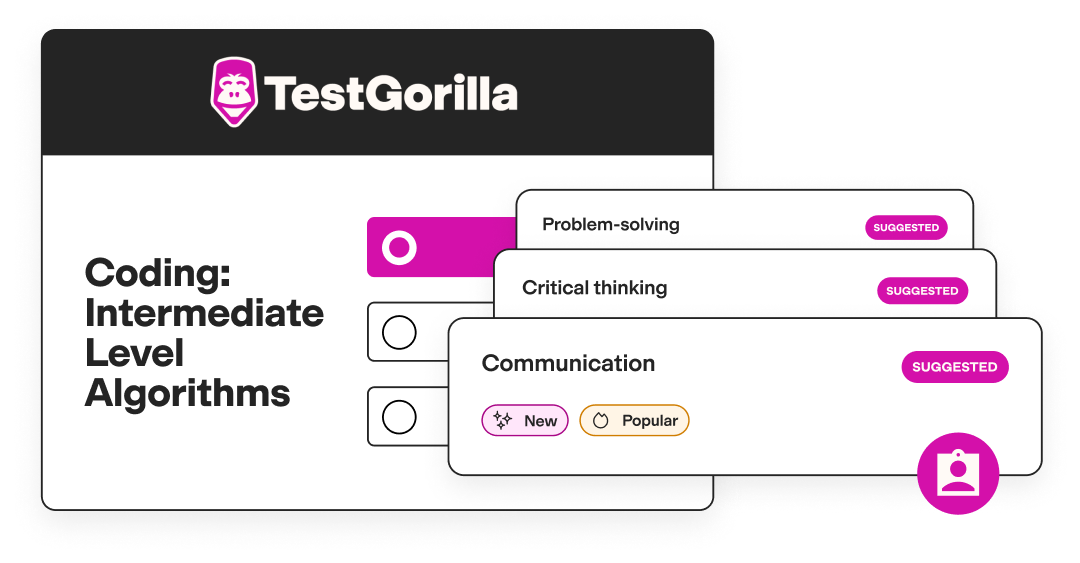C++ Coding Tests
When you’re looking to hire C++ developers, it’s crucial to make sure their coding skills align with the demands of the role. A strong grasp of C++ basics goes without saying, but do they have the proficiency to maximize the high-performance capabilities for software infrastructure, game development, and other computational-heavy applications?
TestGorilla’s 12 universal coding tests help you make the right hiring decisions by quickly and accurately evaluating applicants’ programming skills in 20 languages, including C++. These tests assess candidates’ ability to write and work with code so you can be sure your new hires are equipped to excel in the role, whatever syntax they use
What is a C++ skills test?
Since its development in response to the shortcomings of C, C++ has become one of the most widely used programming languages today. C++ is similar to Java and Python, but it has faster rendering and quicker response times, making it ideal for resource-intensive systems and applications like multiplayer 3D gaming.
Resumes and cover letters can tell you where applicants went to school and list their professional qualifications, but they can’t tell you how proficient applicants are at using C++ and applying it to real-world challenges.
C++ coding tests are the best way to evaluate individuals’ strengths in practical coding skills. Built by highly experienced programming professionals, TestGorilla’s C++ skills tests reveal your candidates' true coding proficiency in areas like data structures, algorithms, and debugging.
Why use C++ skills tests?
Combine C++ coding tests with soft skills, personality, and culture tests to ensure the developers you hire are not only technically proficient but also gel with your team.
Allow candidates to choose their programming language to gauge their versatility and see how well they can integrate C++ with other languages.
Get reliable results from validated tests with built-in anti-cheating measures such as copy/paste restrictions and mouse movement monitoring.
Track more than just test scores – see when candidates switch between different programming languages and paste content, plus review a timeline of their process so you can assess their methodology and the quality of their code.
Find and retain great tech talent – 91% of employers benefited from improved retention using skills-based assessments for tech roles.
Eliminate hiring bias, which affects tech roles more frequently than other industries, with scientifically backed data to guide your decisions.
What roles can you hire for with a C++ coding test?
C++ game developer
Due to its high speed, C++ is the go-to language for game development, especially resource-intensive multiplayer and 3D games. C++ game developers specialize in using C++ and game engines like Unreal Engine to write code that ensures seamless gameplay.
C++ DevOps engineer
DevOps engineers leverage the speed and ability of C++ to streamline complex tasks in the development of real-time data infrastructures like Facebook. People in this role need in-depth knowledge of C++ and strong problem-solving skills to optimize code for efficient resource management and scalability.
C++ application developer
These developers use C++ to make applications for a wide range of platforms and industries, including tech, finance, and streaming service providers. They must be proficient in C++ to ensure high performance, stability, and security – which is especially critical in healthcare and finance.
C++ embedded systems engineer
C++ embedded systems engineers develop software for environments with hardware constraints, like IoT manufacturing, industrial machinery, and automotive technology. These engineers must be skilled at optimizing code for efficiency and reusability.
12 programming skills tested in C++ and 19 other coding languages
Evaluate 12 essential programming skills with coding challenges and simulated tasks. Let candidates solve problems using C++ or any of 19 additional programming languages based on their expertise and experience.
Coding: Data Structures - Stacks and Queues
Coding: Debugging
Coding: Entry-Level Algorithms
Coding: Intermediate-Level Algorithms
Coding: Data Structures - Heaps
Coding: Data Structures - Graphs
Coding: Data Structures - Binary Search Trees
Coding: Data Structures – Binary Trees
Coding: Data Structures – Linked Lists
Coding: Data Structures - Arrays
Coding: Data Structures – Strings
Coding: Data Structures - Hash Tables
Designed by C++ experts
TestGorilla’s C++ coding tests are thoroughly designed and vetted by developers, subject matter experts, and copy editors. To ensure continued effectiveness, they’re routinely evaluated and updated based on test-taker feedback and industry changes.
With over 25 years of experience, Yashavant has authored numerous books and online courses on programming. In recognition of his significant achievements in IT, he was awarded Microsoft's "Best .NET Technical Contributor" and "Most Valuable Professional," as well as the “Distinguished Alumnus Award” from IIT Kanpur.
With a Master’s in Video Game Development and over a decade in the industry, Suneet is a passionate and highly skilled developer. Equipped with an in-depth knowledge of native iOS, Android, and web applications, he currently holds the position of Director of Engineering for a payroll management app.
Alfred, a certified AWS Solutions Architect and DevOps Professional, is a seasoned software engineer whose expertise in Python, data engineering, and cloud architecture powered the creation of a cloud-native data platform for a $16B hedge fund.
Kamil is a freelance programmer with expertise spanning software development, systems administration, and cybersecurity.
Built-in features to support your C++ assessment
See what it looks like in action
All tasks and scenarios are solved in this integrated development environment (IDE). Once the candidate assesses the problem, they can choose C++ as their preferred language from the drop-down menu and solve the question.
Get started with your C++ coding test
Ready to start testing for C++ skills? Screen developers in three easy steps.
1. Create your assessment
Choose an existing universal coding test or create your own custom challenge. Select from up to 20 languages to include in your test including C++, C, and Java.
3. Invite candidates your way
Connect with candidates by sending email invites directly from TestGorilla, straight from your ATS, or by sharing a direct link.
3. Analyze and shortlist top coders
Evaluate candidates’ C++ and coding skills, plus soft skills. Use our dashboard and reports to identify top performers.









